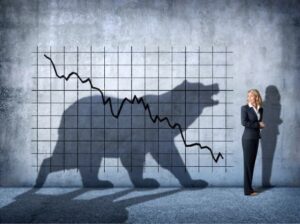Key Points
- A market correction is technically defined as a 10% decline in value for a broader market and can be applied at the security level as well.
- These can occur for a variety of reasons such as broader sentiment turning negative, poor economic data, valuation concerns, etc.
- Investors shouldn’t panic and stick to the plan. These types of market events can provide opportunities for investors to round up or add positions to stocks they like.
Tell Me the Definition of a Market Correction
A market correction is when there is a value decline of 10% or more in the market as a whole or in an individual security/sector. Actually, there is no truly accepted definition of a market correction but just think about it if stocks drop anywhere from 10-20%.
What ultimately causes these can be correlated to various factors such as unfavorable economic data, political changes, or even just investors who claim the market is overvalued (stocks trading at prices too high to make sense).
It is very difficult to accurately predict when a correction will occur from a technical standpoint but corrections and even those that lead into bear markets are a natural component of equity markets.
Should Investors Panic? NO!
The good news regarding market corrections is they have rarely turned into bear markets and usually only last an average of about four months. According to recent research by Charles Schwab, nearly 80% percent of market corrections do not turn into bear markets.
Even more so, a study conducted by Fidelity discovered some of the best performing accounts were those who forgot they even had opened a brokerage account.
Creating wealth takes time and is about sticking to the long term investment strategy (at Genvest we like quality growth). The S&P 500 can also do fine as well if you do not have time to actively research and manage your own portfolio.
Volatility is woven into the DNA of the equity markets and market corrections will occur on multiple occasions throughout an investor’s career. It is important to remember why one should Be Bold When Others are Fearful.









































